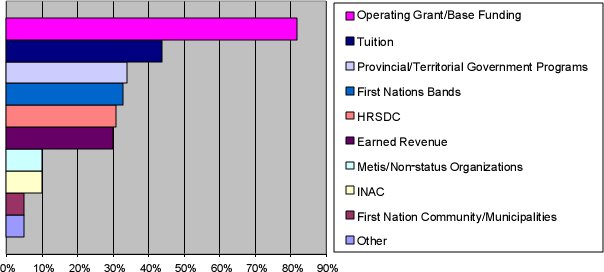
For the most part Aboriginal and mainstream colleges and institutes are funding the assessment, recruitment, advising, counselling and support services described in this report through operating grants or base funding provided by the ministry responsible for colleges and institutes in their provinces, as confirmed by 82 percent of respondent institutions. Tuition was the second most common source of funding for these types of services, used by 44 percent of institutions. Colleges in British Columbia, Alberta, Saskatchewan, the Yukon, Ontario, Quebec and Newfoundland and Labrador, more than a third of respondent institutions, also access Aboriginal program or project funding through their provincial government. For example, some Ontario colleges indicated that they use funds from the Aboriginal Education and Training Strategy of the Ministry of Training, Colleges and Universities to cover human resources costs for Aboriginal counsellors. Thirty-one percent of participating colleges and institutes are accessing funds for support services through AHRDA holders in their regions and First Nations Bands, and one-third also rely on earned revenue to help cover the costs of delivering these services. Métis and Non-Status Organizations are also a source of funding for 13 percent of respondent institutions and 10 percent access the INAC program funding. A few institutions indicated that First Nations communities or municipal structures help fund these services. Examples of other sources of funding identified by colleges and institutes include: in B.C. Aboriginal School Boards and provincial ministries of human resources, health and social services; in Quebec, Correctional Services Canada and the Cultural and Education Institute of the Montagnais.